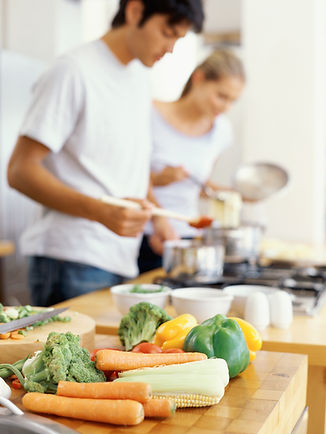Consumer Food Safety
The Retail Food Safety Program at NCHD for consumers centers mainly around educating the general public about how to ensure they are consuming and preparing safe food. That education starts with making all local restaurant inspections available for public viewing. An informed consumer is a smart consumer.
In addition, you will occasionally see our staff out in the community providing information to consumers, particularly around the holidays when we're kicking off our annual Turkey Tips and Food Safety Campaigns.
The CDC estimates that each year roughly 1 out of 6 Americans (or 48 million people) get sick, 128,000 are hospitalized, and 3,000 die of foodborne diseases.
Almost half of all foodborne illnesses can be attributed to food that was prepared or handled at home! We hope that these resources will guide you and your family in preparing and serving food safely!
For complete information about safe food handling & preparation, factsheets and more, CLICK HERE.
Cottage Foods Act
The Cottage Foods Act allows limited types of food products that are non-potentially hazardous (do not require refrigeration for safety) to be sold directly to consumers without licensing or inspection. The Colorado Legislature enacted the Colorado Cottage Foods Act in 2012, allowing limited types of food products to be sold to consumers without licensing or inspections for more information, CLICK HERE.
Proper Cooking Temperatures
Use this chart and a food thermometer to ensure that meat, poultry, seafood, and other cooked foods reach a safe minimum internal temperature.
Remember, you can’t tell whether meat is safely cooked by looking at it. Any cooked, uncured red meats – including pork – can be pink, even when the meat has reached a safe internal temperature.

Reusable Grocery Bags
Reusable grocery bags are great for the environment but can be less than favorable for your health if not regularly cleaned. The bags can become contaminated by germs such as Salmonella or E. coli from food or other items. These germs can then contaminate your groceries on your next trip. If you chose to "go green," make sure you follow these simple steps from foodsafety.gov to keep your reusable bags clean.
Wash reusable grocery bags often.
-
Cloth reusable bags should be washed in a washing machine using laundry detergent and dried in the dryer or air-dried.
-
Plastic-lined reusable bags should be scrubbed using hot water and soap and air-dried.
-
Check that both cloth and plastic-lined reusable bags are completely dry before storing them.
Always put raw meats into a disposable plastic bag before putting them in a reusable bag.
-
A disposable plastic bag helps contain any juices that drip off of raw meat packages, which can touch other foods and contaminate them. Disposable plastic bags are usually available in the raw meat or produce areas of your store.
-
Throw away disposable plastic bags used for raw meat immediately after use. Never reuse bags that contained raw meat or poultry.
Keep meats, fresh produce, and ready-to-eat foods separated.
-
Use separate bags dedicated for meats, fresh fruits and vegetables, and ready-to-eat foods. It’s also a good idea to keep these foods separated in your shopping cart, at the checkout line on the conveyor belt, and at home. This will help reduce cross-contamination.
-
Remember that cold food needs to be refrigerated within two hours of leaving the store or market. Cold food should be refrigerated within one hour when temperatures outside are above 90 degrees.
Store reusable bags at home in a cool, dry place, not in the car.
-
Store reusable bags in a cool, dry place, such as in your home or in the garage. Higher temperatures, like those inside of a car or a car’s trunk, can cause germs like Salmonella bacteria to grow faster.
Do not use reusable grocery bags for other purposes.
-
Bags used for groceries should be used only for food. Don’t carry items such as baby bottles, toys, gym clothes, and other items in the same reusable bags that you take to the grocery store.
These simple steps will help you to reduce cross-contamination, and help keep you and your family safe from harmful bacteria.

Food Safety for High-risk Populations
Food Safety for Individuals with Weakened Immune Systems
BBQ and Potluck Safety
Bacteria that cause foodborne illness like to crash potlucks and parties, and they don’t usually leave their calling card until the party is over. Although you can’t see, taste, or smell them, you can sure feel them when you get sick hours, days or weeks later! Follow these storage, sanitation, and cooking tips to keep uninvited guests away from your next get-together.
CLICK HERE for information on avoiding foodborne illness at your next party.

If you'd like more information on consumer food safety, please contact our Environmental Health Manager:
Melvin Bustos
(970) 867-4918 x2262
melb@nchd.org


